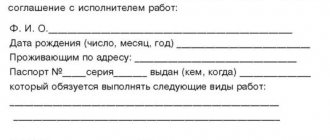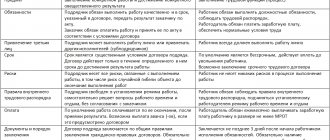Article 67. Labor Code of the Russian Federation Form of an employment contract [Labor Code of the Russian Federation] [Chapter 11] [Article 67] An employment contract is concluded in writing, drawn up in two copies, each of which is signed by the parties. One copy of the employment contract is given to the employee, the other is kept by the employer. The employee’s receipt of a copy of the employment contract must be confirmed by the employee’s signature on the copy of the employment contract kept by the employer. An employment contract that is not formalized in writing is considered concluded if the employee began work with the knowledge or on behalf of the employer or his representative. When an employee is actually admitted to work, the employer is obliged to draw up an employment contract with him in writing no later than three working days from the date the employee is actually admitted to work. When concluding employment contracts with certain categories of workers, labor legislation and other regulatory legal acts containing labor law norms may provide for the need to agree on the possibility of concluding employment contracts or their terms with the relevant persons or bodies that are not employers under these contracts, or to draw up employment contracts in more copies.
An employment contract is an agreement between an employer and an employee on the nature and duration of the employment relationship. An employment contract legally formalizes the mutual rights and obligations of participants in labor relations. A properly drafted employment contract will protect the interests of the employer without infringing on the rights of the employee, and will help avoid many undesirable legal consequences. The parties to the employment contract are the employer and the employee.
An employment contract is an agreement between an employer and an employee, according to which the employer undertakes to provide the employee with work in a designated job function, to ensure working conditions provided for by labor legislation and other regulations, to pay the employee wages in a timely manner and in full, and the employee, for his part, undertakes personally perform the labor function defined by this agreement, comply with the internal labor regulations in force of the employer. The main document regulating labor relations is the Labor Code, and the terms of the employment contract should not contradict its articles. Moreover, in controversial situations, they will be interpreted as described in the labor code.
An employment contract must be distinguished from a work contract. An employment contract provides the employee with a number of benefits, guarantees and compensations not provided for in contractual relations.
Sometimes in practice the terms employment contract and employment agreement are used.
The employment contract is concluded in writing, drawn up in two copies, each of which is signed by the parties. One copy of the employment contract remains with the employee, the other is kept by the employer. The fact that a copy of the employment contract has been received by the employee is certified by the employee’s signature on the copy of the employment contract kept by the employer.
An employment contract that is not formalized in writing is considered concluded if the employee began work with the knowledge or on behalf of the employer or his legal representative. When an employee is actually admitted to work, the employer is obliged to draw up an employment contract with him in writing no later than three working days from the date the employee is actually admitted to work.
According to the labor code, the employment contract may contain additional conditions that do not worsen the employee’s position in comparison with those established by labor legislation and other regulatory legal acts, collective agreements, agreements, local regulations, namely: Condition on specifying the place of work, indicating the structural unit registration and its location; Probationary period condition; Non-disclosure agreement for proprietary or commercial information; A condition on the employee’s obligation to work after training for no less than the period established by the contract, if the training was carried out at the expense of the employer; Agreement on the types and conditions of additional social and medical insurance for the employee; Condition on the possibility of improving the social and housing conditions of the employee; A clause clarifying the working conditions of a given employee, as well as the rights and obligations of the employee and employer established by labor legislation and other regulatory legal acts containing labor law norms.
When concluding employment contracts with certain categories of workers, labor legislation and other regulatory legal acts containing labor law norms may provide for the need to agree on the possibility of concluding employment contracts or their terms with the relevant persons or bodies that are not employers under these contracts, or to draw up employment contracts in more copies.
Nadezhda Lavrova
Hello! The employee must always have a second copy of the contract. In any case, you know that you signed the agreement, albeit in one copy, so try to at least get a copy of it. I understand that if the manager forbids it, then you will not receive a copy, but still try to do it. Since the agreement was signed, you can contact the labor inspectorate at your place of registration with a statement outlining the essence of what is happening to you. Be sure to indicate that you signed the employment contract, but the second copy was not given to you, otherwise the labor inspectorate will write you an answer, which will conclude that there is no employment contract, there is no conversation. Your application will be reviewed and a response will be sent to you within 30 days from the date of acceptance of your application. If the answer does not satisfy you, then the only chance to prove your work activity will be only in court. However, not everything is so simple and good with this. To the court, in addition to the statement of claim, you will have to provide evidence that the work activity was actually carried out by you, that is, you came and worked, and did not just visit the enterprise in your free time. If your former colleagues can go to court with you and declare the fact of their work, then this will be very good, but in practice, there are very few who will want to stand up for you and not lose their job. Therefore, it may turn out that in court you will not be able to provide evidence or witnesses, and therefore the case will be lost. You can try to apply to the prosecutor's office, but only after you receive a response from the labor inspectorate so that you yourself understand whether you should continue to contact the prosecutor's office or the issue will be resolved without it. Cases like yours are not uncommon, but it can be very difficult to prove that you are right.
How to fix?
What to do in the case when the employer stores copies of employment contracts concluded after October 6, 2006, on which there is no employee’s mark on receipt of a copy of the employment contract? The first step is to determine whether a copy of the employment contract was given to each of these employees.
If a copy of the contract was given to the employee, but there was no mark on the contract, contact the employee with a request to put a mark on receipt of his copy on the employment contract stored with you. We advise you to prepare a written notice about this (example)
and ask the employee to sign for its receipt. When the employee marks the receipt of a copy of the employment contract, explain that he must indicate the date on which he actually received his copy of the employment contract.
If the employee has not been given a copy of the employment contract, the employer may contact the employee in writing with a request to receive it. In this case, the employee will mark on the copy kept by the employer the date of actual receipt of his copy.
Now, when conducting an inspection, the State Labor Inspectorate inspector should not have any comments regarding violations of labor laws due to late delivery of an employment contract to the employee. The error has been corrected.
If employees for some reason refuse to receive a copy of the employment contract and (or) mark its receipt, draw up a report. It must be recorded that in order to eliminate violations of labor legislation, employees were asked to formalize in writing the receipt of copies of employment contracts, but they refused to receive them and (or) write them. The notices you signed from employees to do this will also serve as evidence that you have made attempts to correct the violation.
copy of the employment contract - legal advice
The second copy of the contract, in accordance with the labor legislation of the Russian state, must not only be drawn up, but also provided to the employee being employed. If your own rights are violated, you can seek help from the authorized bodies, as well as get more detailed advice from our qualified lawyers.
A copy of the employment contract must also meet all the requirements of the labor legislation of the Russian Federation. If the requirements of the law are violated, the document will lose its legal force.
It must be so!
The employee's receipt of a copy of the employment contract must be confirmed by the employee's signature on the copy kept by the employer.
The receipt mark may look like this: “ A copy of the employment contract has been received
».
It is undesirable to confirm the transfer of a copy of the employment contract using such lexical phrases as: “I received my copy of the contract”, “My copy of the contract was given to me”, “I received a second copy of the contract”, etc. These wordings have an ambiguous meaning or do not accurately convey the meaning what's happening.
The second copy of the contract - what is it for?
The second copy of the agreement is an official confirmation of the labor relations concluded between the parties. The document itself is initially drawn up in two copies. One is kept by the employer, and the other by the employee in its original form.
Important! A copy of the employment contract is provided for in Article 67 of the Labor Code of the Russian Federation. It states that initially the document must be drawn up in two copies, each of which remains with the employer and employee.
An employment contract includes many features and characteristics. Both parties to the relevant agreement should pay close attention to absolutely all points of this document in order to avoid unpleasant situations in the future.
What documents must an employee provide to his direct employer to conclude an employment contract and receive its second copy:
- Employee's civil passport.
- Work book of the employee.
- SNILS.
- Diploma of secondary or higher education.
- Military registration document for an employed citizen.
- Certificate of no criminal record.
On the territory of the Russian state, the most common mistakes when concluding an employment contract are the following:
- The employment contract does not indicate the salary of the employed citizen.
- The employment contract does not contain the name of the locality in whose territory the citizen must be employed.
- The document does not contain information about the conditions of work performed by the citizen.
- The employment agreement does not contain the personal signature of the employee.
- The document concluded between the relevant parties does not contain grounds for drawing up a fixed-term employment contract.
- Availability of contractual jurisdiction. In accordance with the stipulated standards in the labor legislation of the Russian state, the employee has every right to choose the court independently if any controversial situations arise between the parties. However, often the employer specifies in the relevant agreement a specific court of his own choice. This condition is void from the legal point of view of the law.
What to do if the contract is not given?
Some employers “forget” to provide the employee with a second copy of the TD. If you have not been given the original contract after the 3-day period from the start date of work, make a written statement addressed to the head of the organization. Indicate in the document a request for the issuance of a contract and provide the application (in 2 copies) to the personnel officer. One of them must be marked with an incoming registration mark, the second will be considered.
The employer is obliged to provide all types of work-related documents to the employee within 3 days from the receipt of the relevant application (Article 62 of the Labor Code). And given the fact that the employee is entitled to the original of the contract, and not a copy upon initial issuance, this period is reduced to immediate provision. After all, the personnel officer should already have a TD prepared for the employee.
If these measures do not help, there is only one thing left to do - contact the State Labor Inspectorate (GIT). To do this, you can send an application online on the State Services website or personally visit the inspectorate and submit an application right there. Attach to your application an application previously submitted to the employer requesting the issuance of a TD.
A copy of the employment contract: how to draw up the document
A copy of the employment contract is drawn up in accordance with the generally established rules and requirements of the labor legislation of the Russian Federation. Each document must be supported by the corresponding signatures of the parties.
The second copy of the agreement on the territory of the Russian state must contain the following generally binding clauses:
- The name is “employment contract”.
- Employment contract number.
- Date of execution of the relevant document.
- Place of execution of this document.
- Employer information.
- Information about the employee.
- Subject of the concluded employment contract.
- Employee rights.
- Responsibilities of the employee.
- Employer's rights.
- Employer's responsibilities.
- The term of the concluded employment relationship between the parties.
- Other generally mandatory clauses of the contract.
- Personal signatures of both parties.
Qualified specialists of the official website My Lawyer recommend that you remember the following information:
- Always ask your employer for a second copy of the employment contract.
- Leave your personal signature on both copies of the employment contract.
- Carefully read absolutely every clause in the employment agreement. Feel free to re-read the document.
- Check the indication of the place of work in the relevant document.
- Check the salary instructions.
- Check the indication of the validity period concluded between the respective parties to the employment contract.
- Include labor obligations in the contract.
- Check the start time and date of work duties.
- Please read all working conditions carefully.
- Familiarize yourself with your rest routine and schedule.
- The employment agreement is drawn up exclusively in writing.
- If any disputes or conflicts arise, contact the labor inspectorate of the Russian state for help.
- You can always terminate the contract.
Our information
The requirement for mandatory written confirmation of the employee’s receipt of an employment contract by placing a special mark on a copy of the employment contract kept by the employer appeared in the Labor Code of the Russian Federation in connection with the adoption of Federal Law No. 90-FZ of June 30, 2006 “On Amendments to the Labor Code of the Russian Federation, recognizing certain normative legal acts of the USSR as no longer in force on the territory of the Russian Federation and some legislative acts (provisions of legislative acts) of the Russian Federation having lost force” (came into force on October 6, 2006).
Labor Code on registration of labor relations
- on the employee’s personal performance for pay of a labor function (work according to the position in accordance with the staffing table, profession, specialty, indicating qualifications, the specific type of work assigned to the employee);
- on the employee’s subordination to the internal labor regulations when the employer provides working conditions provided for by labor legislation and other regulatory legal acts containing labor law norms, a collective agreement, agreements, local regulations, and an employment contract.
Labor relations arise between an employee and an employer on the basis of an employment contract concluded by them in accordance with the Labor Code (Article 16 of the Labor Code of the Russian Federation). Labor relations between an employee and an employer also arise on the basis of the employee’s actual admission to work with the knowledge or on behalf of the employer or his representative in the case where the employment contract was not properly drawn up.
An employment contract is an agreement between an employer and an employee, according to which the employer undertakes to provide the employee with work for a specified labor function, to provide working conditions provided for by labor legislation and other regulatory legal acts containing labor law norms, a collective agreement, agreements, local regulations and by this agreement, to pay the employee wages in a timely manner and in full, and the employee undertakes to personally perform the labor function determined by this agreement, to comply with the internal labor regulations in force for this employer (Article 56 of the Labor Code of the Russian Federation). The parties to the employment contract are the employer and the employee.
- one copy of the employment contract is given to the employee;
- another copy is kept by the employer.
An employment contract that is not drawn up in writing is considered concluded if the employee began work with the knowledge or on behalf of the employer or his representative (Part 2 of Article 67 of the Labor Code of the Russian Federation).
When an employee is actually admitted to work, the employer is obliged to conclude an employment contract with him in writing no later than three working days from the date the employee is actually admitted to work.
As you can see, the current labor legislation establishes two possible options for the emergence of labor relations between an employer and an employee:
- or on the basis of an employment contract concluded in accordance with the established procedure between the parties;
- or on the basis of the employee’s actual permission to work with the knowledge or on behalf of the employer or his representative.
This is important to know: Irregular working hours in an employment contract: sample 2020
In any case, from the normative provisions of labor legislation it follows that the obligation to properly formalize labor relations with an employee (concluding a written employment contract, issuing an order (instruction) on hiring) is assigned to the employer by the norms of the Labor Code of the Russian Federation.
Can an employee demand documents after dismissal if he himself refused to obtain them during employment?
The essence of the matter was as follows. The employee wanted to avoid foreclosure on wages under a writ of execution. When applying for a job, he asked not to formalize the employment relationship with him. The employer met him halfway. However, after the dismissal, the employee went to court.
Having studied the case materials, the court found that, according to the staffing schedule, the defendant organization had staffing positions for sales managers, a logistics manager and a development manager.
To justify that the employee worked for the organization, he provided evidence of the actual performance of the manager’s work, including information from the organization’s websites, where he was listed as a manager.
Expert opinion
Polyakov Pyotr Borisovich
Lawyer with 6 years of experience. Specialization: civil law. More than 3 years of experience in drafting contracts.
During the consideration of the case, the organization objected to the satisfaction of the employee’s claim, but did not dispute that he performed the work designated by him, received monetary remuneration, while the employment relationship with him was not formalized at his personal request.
During the consideration of the case, the plaintiff denied that the employment contract was not drawn up at his request, referring to the fact that he was not aware of its absence, since he received his salary on time every month and fulfilled the duties assigned to him, there were no claims against him.
The court of first instance concluded that it had established the existence of an employment relationship between the employee and the employer.
The arbitrators indicated that the employee, due to his dependent legal status, cannot be held responsible for the actions of the employer, who, based on the direct instructions of the law, is obliged to formalize labor relations in a timely and proper manner (Article 68 of the Labor Code of the Russian Federation). Moreover, it is the employer who bears responsibility for the consequences that arise when hiring an employee without proper registration of labor relations.
As a result, the court ordered the organization to issue the employee an employment contract, copies of hiring and dismissal orders, and also pay him compensation for moral damage.
How obligatory is it for an employer?
All relationships between employer and employee are regulated by law.
The fundamental document in such relationships becomes the Labor Code of the Russian Federation, in which, in Article 68, the need to issue an order (instruction) on hiring an employee a maximum of three days after he actually returned to his workplace is clearly stated.
Such an order can only be issued on the basis of a signed employment contract between the parties.
At the same time, the employment contract must state in detail on what basis such interaction will be carried out, what remuneration the employee is entitled to, what is the procedure for terminating the contract and some other positions.
Before signing an employment contract, each employee must undergo the following procedures against signature:
- familiarization with internal rules and internal regulations;
- collective agreement;
- internal local acts related to the direct production activities of the employee.
Only on the basis of this document the employer has the right to demand the performance of functions that the employee must perform, and the employee can demand from the employer the performance of his duties.
Including demanding:
- provision of employment;
- equipment necessary to perform production tasks and functional responsibilities;
- social guarantees and more.
The employment contract is signed in two copies, one of which is given to the employee, and the second remains with the employer.
In the absence of such a document, the employee may not be recognized as officially hired, which leads to the absence of any social and financial guarantees, from annual paid leave to compensation upon dismissal.
You can have an employment contract.
Don't let the labor inspector take you by surprise!
The Federal Tax Service has edited the control ratios of VAT declaration indicators.
We invite you to familiarize yourself with: Personal income tax deduction for personal income tax
This is due to the entry into force of the order amending the VAT reporting form. If a company, in order to save on taxes, instead of recruiting a staff of employees, has entered into contracts for the provision of services with several individual entrepreneurs, tax authorities can still recognize the work of such individual entrepreneurs as labor activity and hold the cunning employer accountable for evading the duties of a tax agent for personal income tax.
In the case when a “physicist”, not registered as an individual entrepreneur, purchases goods using a foreign Internet service (for example, eBay), the duties of a tax agent for VAT are not assigned to him.
Lawyers' answers
In accordance with Article 67 of the Labor Code of the Russian Federation, a written employment contract must be concluded no later than three days from the moment the employee is allowed to perform his duties.
The employment contract is concluded in two copies; the employer must hand over the second copy to the employee against signature.
Therefore, the employer is obliged to issue an employment contract to you, and if this does not happen, there is a violation of labor legislation.
Regarding the change of owner. Even if the previous owner was a representative of the employer and through him an employment contract was concluded with you, there is no need to make changes to the employment contract, because at the time the contract was concluded, the former owner had all the rights to enter into such an agreement, and after his dismissal another representative will be appointed, but already for concluding other agreements. If the change of owner does not affect your responsibilities, working conditions and other conditions specified in the employment contract, but there is no need to make changes to this document, the employment contract is completely legal.
Regarding the change in the name of the enterprise. Employment contracts in this regard are also not renegotiated if, apart from the names, there are no other changes. It will be enough to make an entry in the work book, as well as to conclude an additional agreement to the employment contract regarding the changes that have occurred.
Regarding dismissal. An employer does not have the right to prohibit employees from quitting. This is a violation of Article 80 of the Labor Code of the Russian Federation and Article 5.27 of the Code of Administrative Offenses of the Russian Federation.
In this situation, you must write a letter of resignation of your own free will 15 working days before the date of dismissal in two copies. For 15 days because 14 days of work begin to count from the next day of filing the application and, in fact, from the day the director affixed the visa.
You officially register your resignation letter through the registration register, ask for a registration number on your copy. Then you work quietly for two weeks. On the last working day, you demand that you be given your work report and a copy of the dismissal order, as well as make a full settlement with you, compensation for vacation, wages and other compensation that may be provided for by your collective agreement, of course, if you have one.
If you are refused the next day, bring a written statement requesting that you issue a work book and make a full payment, naturally the statement in two copies. You put down the registration on yours, and attach the second copy, along with the two-week-old resignation letter, to the application to the Labor Inspectorate, where you describe that your rights have been violated. you are not fired and are not given pay slips or a work book.
You submit an application to the Labor Inspectorate and within a few days the company will be inspected, the fact of violation of your rights will naturally be established, the company will be fined, and you will receive a settlement. If you want to punish your employer more harshly, you can submit a similar application to the prosecutor.










